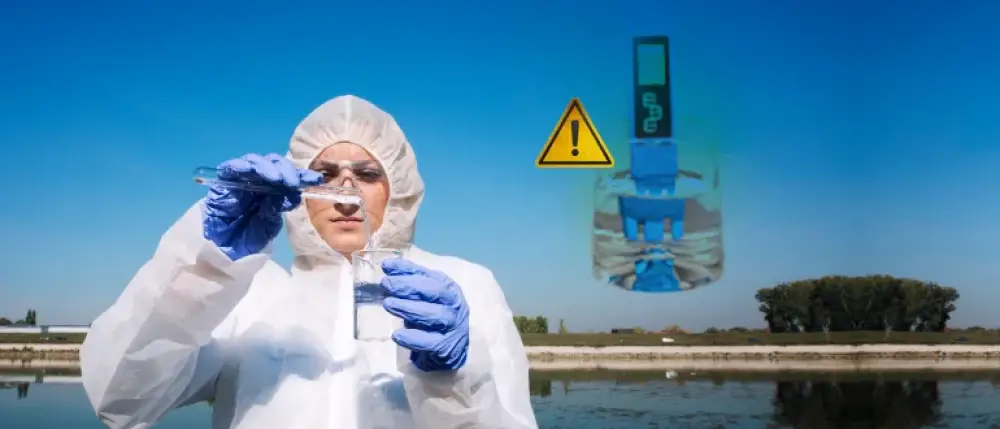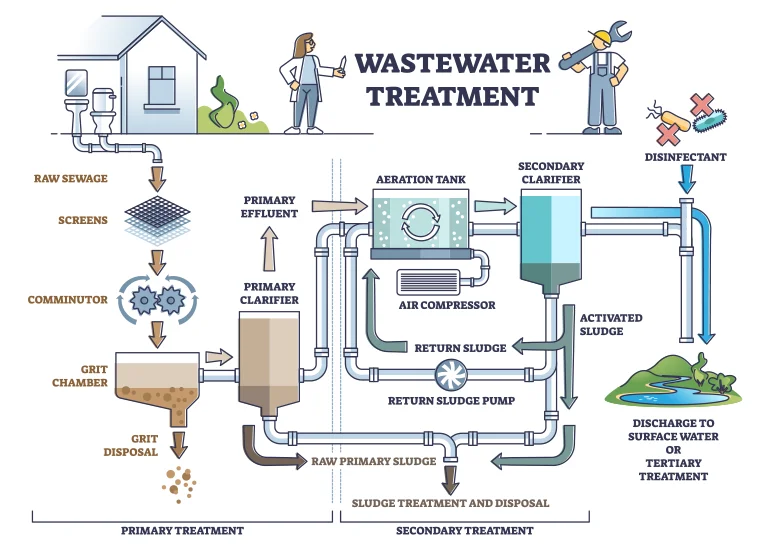Subscribe to get weekly insights
Always stay up to date with our newest articles sent direct to your inbox
Published on 28 Dec, 2023
Updated on 17 Jun, 2025
30374 Views
5 min Read

Written by Care Health Insurance
Reviewed by Care Health Insurance
favorite1Like
Water is the second most essential aspect of life on earth, apart from the air we breathe. Although water constitutes 71% of the earth, only 1.2% is available to us as drinking water. While the major portion of the earth’s water is saline ocean water, the rest of it is locked up in glaciers and ice caps. However, due to the relentless human interference with the environment, the meagre portion of water available for drinking is now rapidly getting contaminated.
The adverse impact of water pollution poses a serious threat to human health causing multiple life threatening diseases.
This article will elaborate on the severe diseases caused due to water pollution. However, before we delve into the adverse impact of water pollution, let’s consider knowing the sources that are responsible for it.
Given below are some major contributors towards water contamination in India:
In the haste of mass-production and profit maximisation, most manufacturing and processing industries ignore their moral responsibility towards the environment. Due to improper waste management practices, tonnes of contaminated water is directly discharged into rivers everyday. This results in a tremendous discharge of toxins into the rivers, streams, seas, aquifers and other water bodies.
Although it may sound weird, the fact is that rural India is the major contributor towards water contamination. Livestock waste such as animal excreta and agricultural runoff are some of key catalysts.
Agricultural runoff is a phenomenon wherein a part of rainfall that does not get absorbed into the groundwater or gets evaporated, and simply runs over the agricultural land and flows into the streams. This hard water is suffused with a huge amount of synthetic pesticides residue that contains arsenic, mainly copper arsenate, lead arsenate and calcium arsenate. This toxicates the river water and makes it unfit for drinking.
Most of the Indian metros are having very poor drainage systems. As a result, an enormous amount of untreated domestic waste, including sewage and wastewater from kitchen-sinks directly flows into the rivers, making them not only unfit for human consumption, but also lethal for aquatic life.
Everyday, millions of tonnes of oil is extracted from the ocean everyday.
Many times, massive oil spills occur due to major accidents in oil refineries and barges.
Oil spills refer to the huge release of crude oil into the marine ecosystem due to mishappenings, which make ocean water non-consumable. Such oil spills not only contaminate the ocean but also seep into the streams that supply water to the humans and flora & fauna.
The most common disease caused due to water contamination is diarrhoea.
This ailment is mainly caused by the enteroviruses that grow in the aquatic ecosystem and get consumed by humans with the contaminated water or the vegetation grown with such water. However, diarrhoea is a symptom that hints towards a possible chronic disease such as gastrointestinal diseases, typhoid, cholera, or dysentery.
However, the effect of water pollution on human life is far-reaching. Contaminated water, if regularly consumed, can disrupt multiple organ systems and can result in various chronic ailments.
>> Also Read: 10 Harmful Effects of Junk Food Unveiled
Here are some of the possible chronic diseases associated with water pollution:
Toxic water primarily hits the respiratory tract of human beings and causes diseases like asthma and chronic bronchitis, which is caused due to inhaling airborne contaminants dissolved in the polluted water.
Bathing and washing with the contaminated water can result in skin irritation, itching, and causes rashes. This can further cause severe skin infections and allergic reactions such as eczema.
Highly toxic substances dissolved in water such as lead, mercury, and traces of pesticides enter the human body upon consumption. If a pregnant woman regularly intakes contaminated water, her offspring is likely to develop neurological damages or malfunctions. Most commonly, babies may be born with congenital disabilities such as cleft mouth or neonatal meningitis which can be fatal for the newborn.
Continuous intake of polluted water contaminated with toxic substances can trigger several reproductive problems such as infertility, erectile dysfunction (ED), and low sperm count. Prolonged consumption of toxic substances in water can also lead to a condition called azoospermia (absence of motile sperm production in semen by the testis).
Although certain metals are essential in drinking water such as zinc and copper in mineral form, polluted water contains traces of heavy metals that are highly toxic for the cardiovascular system. Chronic exposure to toxic metals like lead, cadmium and arsenic can cause heart problems and stroke.
A healthy human’s liver performs more than 500 vital functions in the body, including the key ones— production of bile for digestion of fat, and protein for blood-plasma. However, prolonged intake of contaminated water can seriously damage the liver. Various pathogens present in toxic water drastically raise the SGPT and SGOT levels of the liver and further cause liver infections such as viral hepatitis and jaundice.
Our kidney performs the most vital function of our body, i.e. filtering out impurities from blood and excreting it as urine. However, untreated supply water can contain various lethal contaminants such as benzene, trichloroethylene (TCE), and vinyl chloride (used in making PVC). These contaminants are the key factors responsible for renal cancer and urinary bladder cancer, which can ultimately lead to kidney failure.
Apart from the cancers of the urinary system, the toxic chemicals and pollutants found in contaminated water can also increase the risk of other types of cancers such as leukaemia (blood cancer) and lymphoma (cancer of the lymph system).
Prolonged consumption of polluted water can seriously affect the mental health of an individual, and can trigger issues like stress, anxiety, and depression. Polluted water with TDS above 300 ppm has traces of lead that attacks and disables a protein receptor in the human brain called NMDA receptor. This receptor is essential for mental development, especially cognitive function and learning. Chronic consumption of unfit drinking water can thus increase the risk of mental issues like obsessive compulsive disorder (OCD), Attention-deficit/hyperactivity disorder (ADHD), autism, and Tourette syndrome, in which patient encounters certain movements repeatedly such as winking, grimacing or shrugging.
Besides, it can hinder the normal psychological growth of children, which can even result in mental retardation. Besides, children can face neurodevelopmental issues and can suffer from psychiatric disorders even at low levels of exposure to water pollutants that affect human health.
These are some of the possible health threats associated with water pollution that can affect normal human life.
The grave concern of water pollution and its deteriorating health effects can only be addressed with certain preventive measures at domestic and municipal levels. While at domestic level, every household must use RO purifiers for drinking water, and get them serviced every three months, it is the moral responsibility of the urban administration to install proper wastewater and sewage treatment plants in every district.
Even the Article 21 of the Indian Constitution guarantees access to clean water to every individual.
Hence, the government must ensure this right to every Indian citizen by providing safe drinking water.
Here is how an ideal wastewater treatment plant works—

Knowing the catastrophic health implications of water pollution and diseases caused due to it, it is essential to get your family covered against the critical illnesses such as cancer and heart attack.
When it comes to buying health insurance, it is important to entrust your health related needs in reliable hands. Care Health Insurance has been gaining accolades for serving this industry with their best and comprehensive health insurance plans that are tailor-made for you and your family. These plans can be customised as per your insurance needs. With health insurance, cover the health of your family against life-threatening diseases.
Disclaimer: Verifying the policy details and coverage with the official policy documents is essential. Also, kindly consult a professional medical expert to verify the details of health concerns.
Thyroid : मामूली नहीं हैं महिलाओं में थायराइड होना, जानें इसके लक्षण और घरेलू उपचार Vipul Tiwary in Diseases
शुगर कंट्रोल कैसे करे? जानें, डायबिटीज में क्या खाना चाहिए Vipul Tiwary in Health & Wellness
हाई ब्लड प्रेशर को तुरंत कंट्रोल कैसे करें? देखें इसके उपाय Vipul Tiwary in Diseases
पैरों में दर्द किस कमी से होता है? जानें, इसके घरेलू इलाज Vipul Tiwary in Health Insurance Articles
Sustainability in Healthcare: What 2026 Will Look Like Jagriti Chakraborty in Health Insurance Articles
The Science of Oil Pulling: Dentist’s Perspective vs. Ayurvedic Tradition Mudit Handa in Home Remedies
7 Surprising Benefits of Matcha You Probably Never Knew! Jagriti Chakraborty in Health & Wellness
Is Makhana a Healthy Snack to Eat Every Day? Sejal Singhania in Health Insurance Articles
Always stay up to date with our newest articles sent direct to your inbox
Loading...